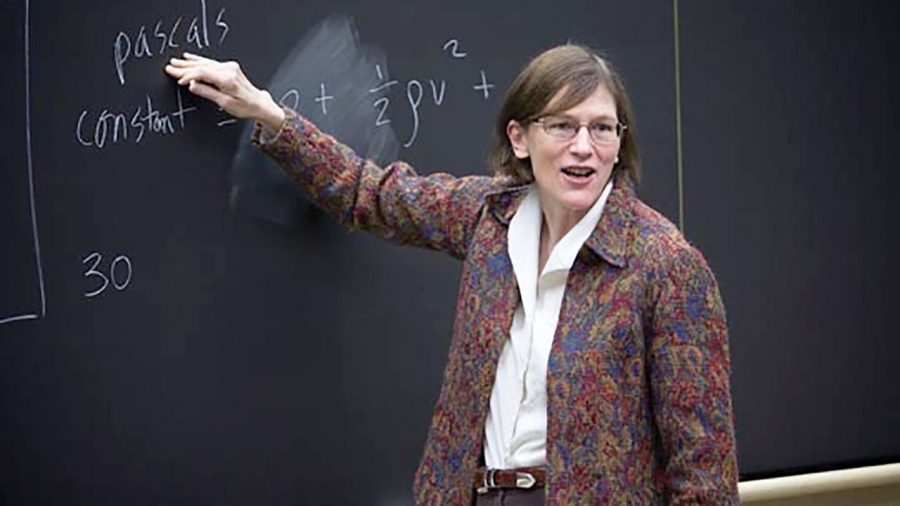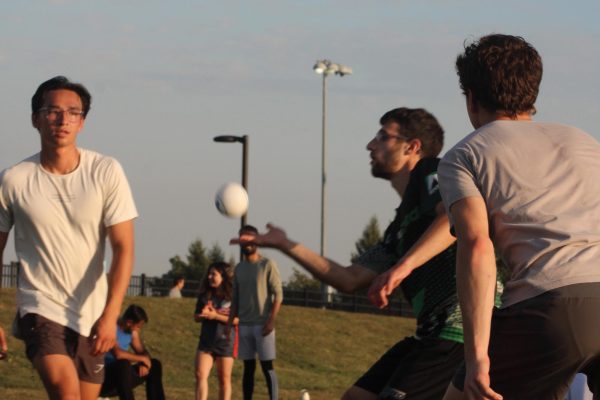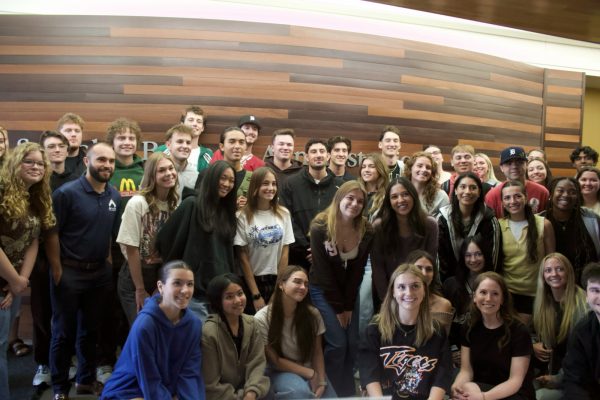Professor Barbara Oakley named highly influential woman in engineering
Photo courtesy of Oakland University
Professor Barbara Oakley at the blackboard working out an equation for her class. Her hard work and dedication have earned her notoriety as an influential voice in the world of Engineering.
Oakland University Professor Barbara Oakley has been named as a ‘highly influential woman in engineering’ by Academicinfluence.com.
Oakley first came to OU as a masters and doctorate student in 1995. Three years later, in 1998, she was brought on staff in the Electrical Engineering Department.
“I was hired as a 10-year track faculty and taught in the electrical engineering department. Eventually [I] moved over to the Industrial and Systems Engineering Department,” she said.
With her time at OU, she has written many books and articles on topics ranging from science, technology, engineering and mathematics (STEM) to learning practices.
“I had written a number of books on learning math and science — kind of what goes on in the brain and how can you be the most effective. I co-edited a book called ‘Pathological Altruism’ and my latest book just came out last month called ‘Uncommon Sense,’” Oakley said.
Most notably, her book “A Mind for Numbers: How to Excel at Math and Science (Even if You Flunked Algebra)” was published with Penguin Random House.
“On the field, for example, if you’re trying to be successful as a coder or an engineering student or whatever you might be studying along those lines, “Mind for Numbers” became that book,” Oakley said. “No one thought it would ever do anything but it’s sold over a million copies worldwide.”
The topics from her book are seen in “Learning How To Learn: Powerful mental tools to help you master tough subjects.” This course was co-created and taught by her and is available on Coursera. Enrollment is available anytime for the course and it’s asynchronous, meaning there’s no meetings/meeting times.
Oakley has written op-eds for major outlets like The Wallstreet Journal and The New York Times. When she’s not doing all of that, she’s traveling the world speaking.
“I speak about insights relating to learning that are quite different from the insights that are commonly provided by educators and psychologists because these grow from no science. I often speak about how to learn well, to speak about teaching and novel insights on teaching from a neuroscientific perspective,” Oakley said.
In February 2021, Oakley and her team applied for the distinguished title, now Oakley has been named as a highly influential woman in the field of engineering.
“I have friends who, I think, look out for my fair sometimes better than I do, but they were like ‘it would be very good if you were to go up for distinguished.’ Me and my team forwarded the nomination package and lo and behold, to my happy shock, it was approved,” Oakley said.
The list of 35 women selected range from “pioneers in engineering sub-disciplines like computer science and electrical engineering to the newest generation of revolutionary thinkers in areas like nano-medicine and nuclear power,” according to Academicinfluence.com.
“Engineering has a reputation as a mostly male profession,” said Dr. Jed Macosko, academic director of AcademicInfluence.com and professor of physics at Wake Forest University, in an OU press release. . “We want to set the record straight and let more people know that women engineers are not only growing in number; but are also driving the field forward in new and creative ways. They bring innovative thinking and bold solutions that make their professions better; and more people need to know who they are and see why they are the vanguard of a new era in engineering.”
Oakley believes that the STEM field should have more women and that what she’s working on is truly important. She finds that whatever happens because of her work, given the title of a highly influential woman, helps give her work more impact.
“It’s of less importance to me than actually having an impact in helping students and people lead better lives,” Oakley said.






